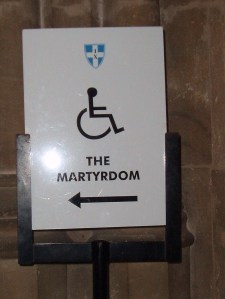
Today’s Featured Writer has something to say about the future of the church. But, he has an altogether different perspective, than our previous guest writer, John O’Keefe, and actually, most people. And this, in a nutshell, is Doug Jackson. But you could ever squeeze him into a nutshell, so never mind. He is a thoughtful and gifted thinker, a searching pilgrim, a devoted Christian, and a baking whiz. And, he’s topped with more than a modest dollop of wisecrackiness.
Please enjoy and interact with Doug’s contribution.
Mini-Bio: Doug Jackson
Director of Logsdon Programs, Instructor of Spiritual Formation at South Texas School of Christian Studies, in Corpus Christi, TX.
- D.Min. – Truett Seminary ( 2006)
- M.Div. – Southwestern Baptist Theological Seminary (1985)
- B.A. – English Literature, Grand Canyon College (1982)
The Church with a Future
-Doug Jackson
John O’Keefe is a futurist. I find that intimidating as heck. Personally, I’m a traditionalist. I can quantify the difference. Tramping through the jungle, a futurist and a traditionalist happen on some tiger tracks. “You track him,” suggests the traditionalist, “and find out where he’s going. I’ll backtrack and find out where he’s been.”
There isn’t even a cool name for the preferred direction for my arrow of time. “Futurist” conjures up images of, well, guys with shaven heads and soul patches. “Traditoinalist” calls up images of guys with bald heads (which is SO not the same thing) and no soul at all. This part I can at least work on. I think from now on instead of “traditionalist,” I’ll call myself a “past-er.”
So what can a past-er say to the church’s future? If there is, in the words of T. S. Eliot’s J. Alfred Prufrock, “time for a hundred visions and revisions” of the people of God in community, how much time do we have (and should we allow) for a rear-vision? Not too much, I don’t guess. Accordingly, I want to state a thesis and offer three theories. My thesis is that, whatever the church OF the future looks like, the church WITH a future will be the one with a past.
To speak of the church OF the future is simply to make a chronological observation. It means “the church that isn’t here yet.” It doesn’t tell us much about what this church will do or how long it will last. By the church WITH a future I mean the local community with staying power. And this church, I believe, has a future precisely because it has a past. Which leaves my three notions of what such a church looks like.
First, I believe that the church with a future cares less about the draft of its craft than the depth of its ocean. In his eightieth sonnet, Shakespeare admits to his chick that other poets can praise her better. So why should he keep scribbling? Then the bard continues:
But since your worth, wide as the ocean is,
The humble as the proudest sail doth bear,
My saucy bark inferior far to his
On your broad main doth willfully appear.
Your shallowest help will hold me up afloat,
Whilst he upon your soundless deep doth ride.
In other words, what matters is that her merit can bear the burden of grand praises and meager ones. I come from a generation of ministers who learned that good meant big so bigger meant better. I think the church with a future looks back on the mighty acts of God in history and realizes that the Queen Mary of the megachurch and the rowboat dinghy of the corner congregation all float on the vast sea of God’s greatness, and that plumbing this depth, not scaling our own impressive rigging, is what counts.
Second, I believe that the church with a future cares more about reading its story than writing its narrative. “Narrative” seems to be a big word in church these days. As far as I can tell, it has a lot to do with composing our own future in a compelling way that attaches single acts of worship or service to a greater purpose. I’m all for that, but I think it is important to remember that, at best, we’re writing one chapter in a very long book whose plot is already clearly laid out. This even works at the local church level. Eugene Peterson warns us in The Contemplative Pastor that, “the cure of souls takes time to read the minutes of the previous meeting, a meeting more likely than not at which I was not present.”
We find those minutes recorded in church history and church hymnals, two documents which have fallen from favor in my own denomination, where we seem to believe that the church poll-vaulted from Pentecost over several regrettable centuries until she landed safely in our own generation. That’s why we jettisoned a songbook that came to us polished by millennia of theological mulling on the part of the worldwide body of Christ and opted instead for toe-tappers and hand-clappers that can give us no idea of who we are.
I’m not knocking contemporary music, nor do I believe the Spirit quit inspiring songwriters somewhere around the time Fanny Crosby died. But because more recent music has not had the advantage of the filtering years, I would like to apply C. S. Lewis’ dictum about books to the business of congregational singing: “After (singing) a new (song), never allow yourself another new one till you have (sung) an old one in between. If that is too much, you should at least (sing) one old one to every three new ones.” (I should admit here that Lewis disliked ALL hymns because he thought the poetry was bad. He’s probably right, but to me it seems that their theology is rather good.)
Finally, I believe that the church with a future cares more about present faithfulness than future viability. Because the church of the future will be a mess. Do what we will (and I hope we will), she will remain a morass of carnality and littleness and arguments over service times and carpet samples for the new fellowship hall. And she will be the Body of Christ, the one institution Jesus ever promised to care about, and one which he said would sit on an unshakable foundation.
So the church with a future doesn’t spend too much time reading the chicken guts of the changing culture and dealing a Tarot deck of trends. She doesn’t cross with sliver the grasping palms of earringed “consultants” ensconced in dark tents of occult insider info.
Lewis’ Screwtape rightly warns his protégé Wormwood that the proper focus of human endeavor is the junction of Right Now and Forever which leads us to ask what we need to do in the former in order to serve the latter. But “the future is, of all things, the thing least like eternity.”
The beauty of futurists like John is that they won’t let us rest in Merlin’s tower forever gazing at some ecclesiastical zodiac; they keep demanding that we do something about this stuff. They refuse to let us fall into Screwtape’s trap of forgetting that the future is not (Screwtape again) “a promised land which favoured heroes attain,” but rather “something which everyone reaches at the rate of sixty minutes an hour, whatever he does, whoever he is.”
In short, I should simply say that the Church is the church with a future. For two thousand years we have hijacked her with our high-handedness, betrayed, bureaucratized, bushwhacked and bamboozled her, tarted her up, sold her out, locked her in and dragged her down. We have made her impertinent, irrelevant, irreverent and irritating. We have used her to camouflage our carnality and let the slimming stripes of the martyrs’ scars hide the midriff bulge of our overfed carnality. “And for all this,” the poet Gerard Manley Hopkins reminds us (if I may take a large liberty), Christ’s church
| . . . is never spent; | |
| There lives the dearest freshness deep down things; | 10 |
| And though the last lights off the black West went | |
| Oh, morning, at the brown brink eastward, springs— | |
| Because the Holy Ghost over Christ’s bent | |
| (Bride) broods with warm breast and with ah! bright wings. |
What feedback do you have for Doug?






